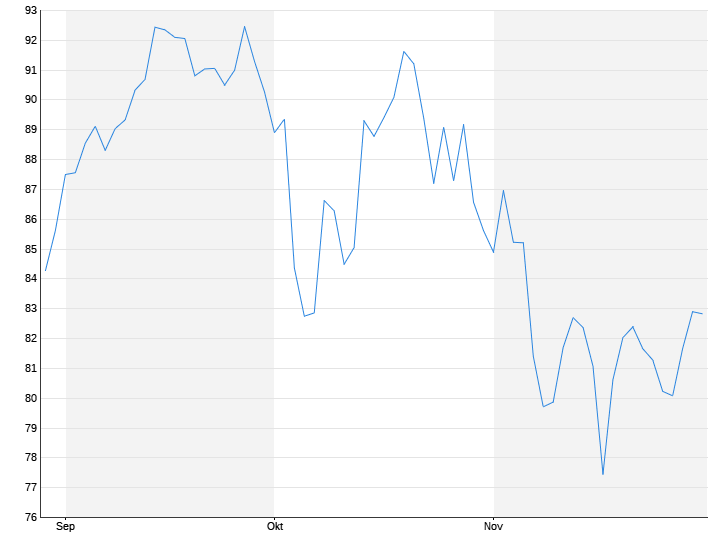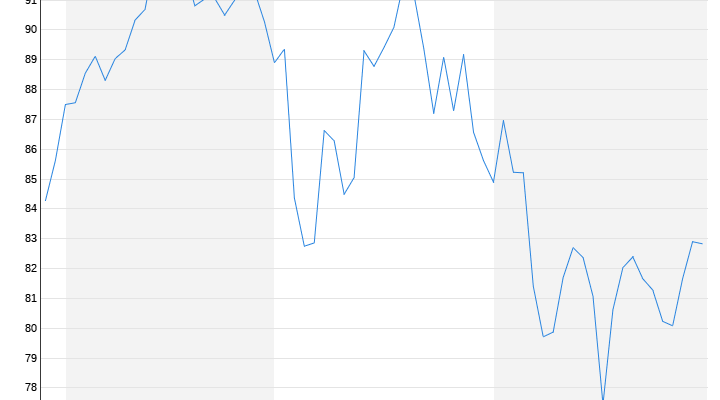Prices still fall
OPEC+ wants to further reduce crude oil production
November 30, 2023, 8:31 p.m
Listen to article
This audio version was artificially generated. More info | Send feedback
Next year, OPEC+ wants to reduce its production volumes again. Nevertheless, the oil price is falling on the markets. Observers suspect disagreement within the association of more than twenty states.
Members of the large oil cartel OPEC+ want to further reduce their production in the first quarter of next year. After an online meeting, the group said oil giants Saudi Arabia and Russia would maintain their existing restrictions totaling 1.3 million barrels (159 liters each) per day until March. Six other members of the association would also reduce their daily production volumes by almost 700,000 barrels of crude oil in the next quarter, it was said.
Oil prices fell despite the cuts. A barrel of North Sea Brent for delivery in January cost 81.50 US dollars (74.79 euros) in the evening. That was $1.38 less than the day before. The price for a barrel of the American variety West Texas Intermediate (WTI) fell to a similar extent to $76.60.

The reason for this is probably that not all 20 OPEC+ countries are participating in the supply reduction. Market observers speculated that there was a lack of unity. Russia and OPEC+ put their planned cuts at a total of 2.2 million barrels per day. However, this includes the extension of the current restrictions by Saudi Arabia and Russia, as well as a planned export reduction of Russian refined products.
Moscow supports the delivery cut
Russia has justified cuts in oil production by the OPEC+ countries with the need to stabilize the market. “The decisions that have been made are primarily aimed at eliminating risks in times of low demand,” Alexander Novak, the deputy head of government in charge of the energy sector, told Russian state television. In the first quarter of 2024, the production cut will be 2.2 million barrels per day. Russia will participate in this by cutting deliveries of 200,000 barrels of oil products per day, Nowak said.
According to him, demand is declining seasonally. The OPEC+ organization had to react to this in order to keep prices stable. However, the participating countries would closely monitor further market developments. Originally, Russia’s daily production quota for 2024 was 9.95 million barrels of oil.
In February 2023, Moscow reduced deliveries to the world market by 500,000 barrels due to a lack of demand, and in July by another 500,000 barrels. Since September, Russia has been bringing 200,000 more barrels of oil onto the market every day. This amount is now apparently to be offset by reducing deliveries of oil products.
Brazil should join the funding association
OPEC+ also announced that Brazil should join the production network at the beginning of next year. The country is considered an up-and-coming oil producer that has steadily expanded its production in recent years.
So far, ten countries in the Organization of Petroleum Exporting Countries (OPEC) and ten other countries within the framework of OPEC+ have agreed on production targets in order to support prices. The group, dominated by Saudi Arabia and Russia, produces about 40 percent of global oil supply, which was around 102 million barrels per day in October.
The cartel’s online meeting took place on the opening day of the World Climate Change Conference (COP28). Before this conference in Dubai, the UN Environment Program (UNEP) pointed out that the planned worldwide production volumes of oil, gas and coal were still well above the level that would be compatible with containing climate change.
Oil market speculates on extension of production cuts
The International Energy Agency (IEA), founded by industrialized countries, criticized in a report before the climate conference that the oil and gas sector was “watching from the sidelines during the energy transition.” The IEA called for no more searching for new extraction areas and for emissions from the transport and extraction of raw materials to be drastically reduced.
OPEC Secretary General Haitham Al Ghais reacted angrily this week. “In a world where we need more dialogue, pointing fingers at others is not constructive,” he said in a statement. Global CO2 emissions should be reduced, but at the same time economic growth, social advancement and energy supply must be secured, emphasized Al Ghais.
